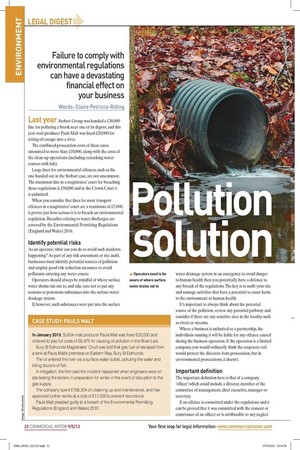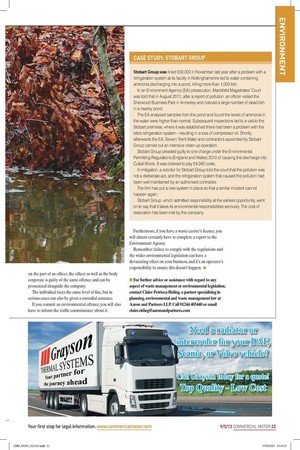Failure to comply with environmental regulations can have a devastating
Page 15

Page 16

If you've noticed an error in this article please click here to report it so we can fix it.
financial effect on your business Words: Claire Petricca-Riding Last year Stobart Group was handed a £30,000 fine for polluting a brook near one of its depots, and this year malt producer Pants Malt was fined £20,000 for letting oil escape into a river.
The combined prosecution costs of these cases amounted to more than £10,000, along with the costs of the clean-up operations (including restocking watercourses with fish).
Large fines for environmental offences, such as the one handed out in the Stobart case, are not uncommon. The maximum fine in a magistrates' court for breaching these regulations is £50,000 and in the Crown Court it is unlimited.
When you consider that fines for most transport offences in a magistrates' court are a maximum of £5,000, it proves just how serious it is to breach an environmental regulation. Breaches relating to water discharges are covered by the Environmental Permitting Regulations (England and Wales) 2010.
Identify potential risks As an operator, what can you do to avoid such incidents happening? As part of any risk assessment or site audit, businesses must identify potential sources of pollution and employ good risk reduction measures to avoid pollutants entering any water course.
Operators should always be mindful of where surface water drains run out to, and take care not to put any noxious or poisonous substances into the surface water drainage system.
If, however, such substances were put into the surface water drainage system in an emergency to avoid danger to human health then you potentially have a defence to any breach of the regulations. The key is to audit your site and manage activities that have a potential to cause harm to the environment or human health.
It's important to always think about the potential source of the pollution, review any potential pathway and consider if there are any sensitive sites in the locality such as rivers or streams.
Where a business is unlimited or a partnership, the individuals running it will be liable for any offence caused during the business operation. If the operation is a limited company, you would ordinarily think the corporate veil would protect the directors from prosecution, but in environmental prosecutions, it doesn't.
Important definition The important definition here is that of a company 'officer', which could include a director, member of the committee of management, chief executive, manager or secretary.
If an offence is committed under the regulations and it can be proved that it was committed with the consent or connivance of an officer; or is attributable to any neglect on the part of an officer, the officer as well as the body corporate is guilty of the same offence and can be prosecuted alongside the company.
The individual faces the same level of fine, but in serious cases can also be given a custodial sentence.
If you commit an environmental offence, you will also have to inform the traffic commissioner about it. Furthermore, if you have a waste carrier's licence, you will almost certainly have to complete a report to the Environment Agency.
Remember: failure to comply with the regulations and the wider environmental legislation can have a devastating effect on your business, and it's an operator's responsibility to ensure this doesn't happen. • • For further advice or assistance with regard to any aspect of waste management or environmental legislation, contact Claire Petricca-Riding, a partner specialising in planning, environmental and waste management law at Aaron and Partners LLP. Call 01244 405440 or email clairesiding@aaronandpartners.com CASE STUDY: PAULS MALT In January 2013, Suffolk malt producer PauIs Malt was fined £20,000 and ordered to pay full costs of £6,475 for causing oil pollution in the River Lark.
Bury St Edmunds Magistrates' Court was told that gas fuel oil escaped from a tank at PauIs Malt's premises on Eastern Way, Bury St Edmunds.
The oil entered the river via a surface water outfall, polluting the water and killing dozens of fish.
In mitigation, the firm said the incident happened when engineers were on site testing the boilers in preparation for winter in the event of disruption to the gas supply.
The company spent £106,304 on cleaning up and maintenance, and has approved further works at a cost of £11,000 to prevent recurrence.
PauIs Malt pleaded guilty to a breach of the Environmental Permitting Regulations (England and Wales) 2010. Stobart Group was fined £30,000 in November last year after a problem with a refrigeration system at its facility in Nottinghamshire led to water containing ammonia discharging into a pond, killing more than 1,000 fish.
In an Environment Agency (EA) prosecution, Mansfield Magistrates' Court was told that in August 2011, after a report of pollution, an officer visited the Sherwood Business Park in Annesley and noticed a large number of dead fish in a nearby pond.
The EA analysed samples from the pond and found the levels of ammonia in the water were higher than normal. Subsequent inspections led to a visit to the Stobart premises, where it was established there had been a problem with the site's refrigeration system — resulting in a loss of compressor oil. Shortly afterwards the EA, Severn Trent Water and contractors appointed by Stobart Group carried out an intensive clean-up operation.
Stobart Group pleaded guilty to one charge under the Environmental Permitting Regulations (England and Wales) 2010 of causing the discharge into Cuttail Brook. It was ordered to pay £4,040 costs.
In mitigation, a solicitor for Stobart Group told the court that the pollution was not a deliberate act, and the refrigeration system that caused the pollution had been well maintained by an authorised contractor.
The firm has put a new system in place so that a similar incident cannot happen again.
Stobart Group, which admitted responsibility at the earliest opportunity, went on to say that it takes its environmental responsibilities seriously. The cost of restoration has been met by the company.



















































